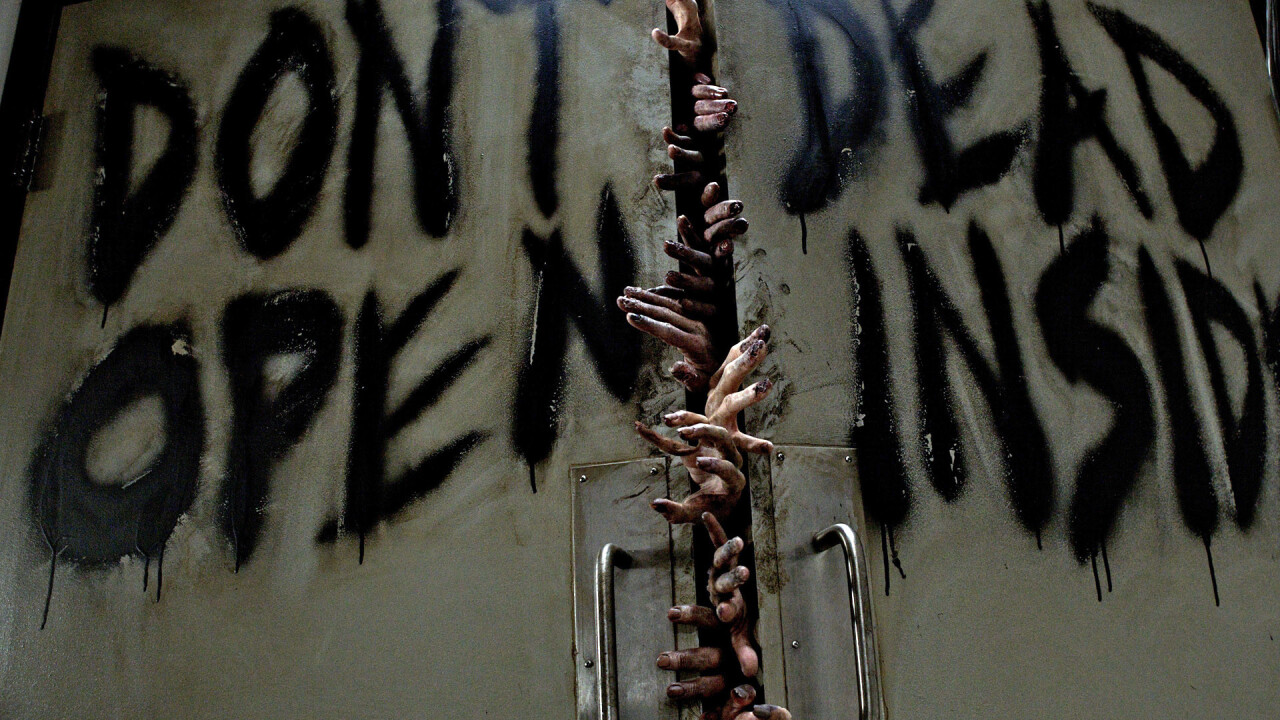
Danny Boice is the co-founder and CTO of Speek – a 500 Startups-funded startup that let’s users do conference calls with a simple link rather than using phone numbers and PINs.
I recently started watching “The Walking Dead” (I know, I know, late to the party). I’ve been mainlining the show relentlessly on Netflix and am now on Season 3.
From the very beginning, I’ve been struck by how similar is the plight of Rick—the blue-steely-eyed sheriff’s deputy bravely leading his band of non-zombies—to my own experience co-founding my startup Speek, where for the past year-and-a-half we’ve been working to make mobile conference calls easy, and building a team and a culture in the process.
I know what you’re thinking: “insert our-out-of-date-competitors-are-zombies joke here,” right? Ha! Wrong! How little you people know me. I’m saving those for later.
But even without the zombie comparisons, the world of a startup is a lot like TWD’s zombie apocalypse. Just like Rick, we find ourselves dealing with team dynamics, difficult people, competing priorities, daily threats, and the concept of solving for “perfect world” scenarios vs. simply surviving to fight another day.
Also, like any startup, we are constantly hampered by scarce resources and a shockingly high mortality rate.
So without further ado, I hereby present the three things I’ve learned (or relearned) about leadership from watching “The Walking Dead,” or “How I realized that building a startup is just like surviving a global struggle against flesh-eating zombies.”
1. Be decisive
During seasons 1 and 2, Rick is a real flip-flopper. Take the whole Randall situation. (Oh yeah: Spoiler alert! Pretty much from here on out.)
Randall is the guy Rick decides to save when Randall is initially impaled on a fence despite the fact that Randall was shooting at him minutes earlier. Rick takes him back at the farm, decides to release him, changes his mind, fights Shane, they all almost die, Rick decides to kill Randall after all, changes his mind mid-execution, and Shane ultimately kills Randall and then tries to kill Rick.
Ummmm, what? Why not leave Randall on the damn fence? Season 2 is over.
This isn’t even the first example of Rick’s terrible flip-flopping. At the very beginning of Season 1, Rick decides Merle Dixon (Daryl’s meth-snorting, antibiotic-toting, bastard redneck of a brother) is trouble and leaves him handcuffed to a roof with zombies in hot pursuit (cold pursuit? I don’t know, something something zombie joke).
Rick escapes and finds his wife and son (yay!), then takes the group back to Atlanta—zombie-riddled Atlanta, which he just escaped from—to try and free Merle! Eventually, they work their way back to the rooftop only to find that Merle has freed himself 127 Hours-style and is now in the wind and out for blood.
Look, Rick, if you decide a guy is bad enough news that you leave him as zombie meat chained to a rooftop, then he’s bad enough for you to just shoot him and get it over with.
The lesson: As a leader, your initial decision is often the correct one. This doesn’t mean you should follow it blindly, but it does mean that you should work quickly to validate or invalidate using all available data, with a full understanding that you’ll never have perfect information.
Yes, sometimes you’ll be wrong, and you’ll pay the price. Leadership is a risky endeavor. But that price is almost definitely going to be lower than the cost of constantly waffling back and forth, not only in terms of time and resources but also the respect and confidence of your team. The die is cast. Cross the Rubicon. Kill Merle dead.
2. Kill the cancer
Time and again, the team is threatened from trouble within. Without fail, when Rick identifies this cancer quickly and deals with it effectively (like with Tomas in Season 3) the end result is much less worse than when Rick lets the cancer fester (Shane. Oh maaaannnn, Shane.)
Rick’s reluctance to see the threat Shane poses is understandable: the guy is (“was,” Rick! “Was!”) his best friend. But in denying the increasingly obvious Shane problem, Rick nearly gets himself killed and costs plenty of others’ lives (Otis, for example). Also, dude, he totally knocked up your wife.
At the beginning of Season 3, it seems like Rick has learned his lesson and he deals with Tomas, clearly a bad egg from the get go, much more efficiently. Here’s hoping he doesn’t unlearn this lesson in the seasons to come (personally, I don’t like the odds).
The lesson: As well as working to make sure his team can succeed externally—out in the real world, vs. zombies or a zombified telecommunications industry (there it is!)—, a good leader has to manage his own team internally. Problematic team members can spread their crappiness with surprising quickness, decimating culture and productivity in the process.
As the leader, you have to identify these problems and then get rid of them. You may not want to do this. You may be emotionally conflicted. Tough. Leadership isn’t for everybody.
3. Balance your “Perfect World” vs. basic survival
In “The Walking Dead,” the world has been destroyed. The population has been decimated. However, this unthinkable disaster also presents opportunities. The opportunity to start over, to build a new life on a clean slate. So long as you can keep zombies from eating your face off. Which they are trying to do, you know, constantly.
The Lesson: A good leader must identify when she or he should aim for a “perfect world” solution versus being happy just surviving. At times your startup will have the benefit of building your dream team. Other times you’ll be strapped for cash and in need of a quick hire. Balancing these conflicting priorities is essential to leading your startup successfully.
So there you have it: decisive action, the willingness to make tough, even unpopular decisions, and the ability to balance your ideal model vs. real world pressures. Whether launching a startup or shooting zombies in the face on your way to the CDC, it’s a great recipe for leadership success.
Get the TNW newsletter
Get the most important tech news in your inbox each week.







